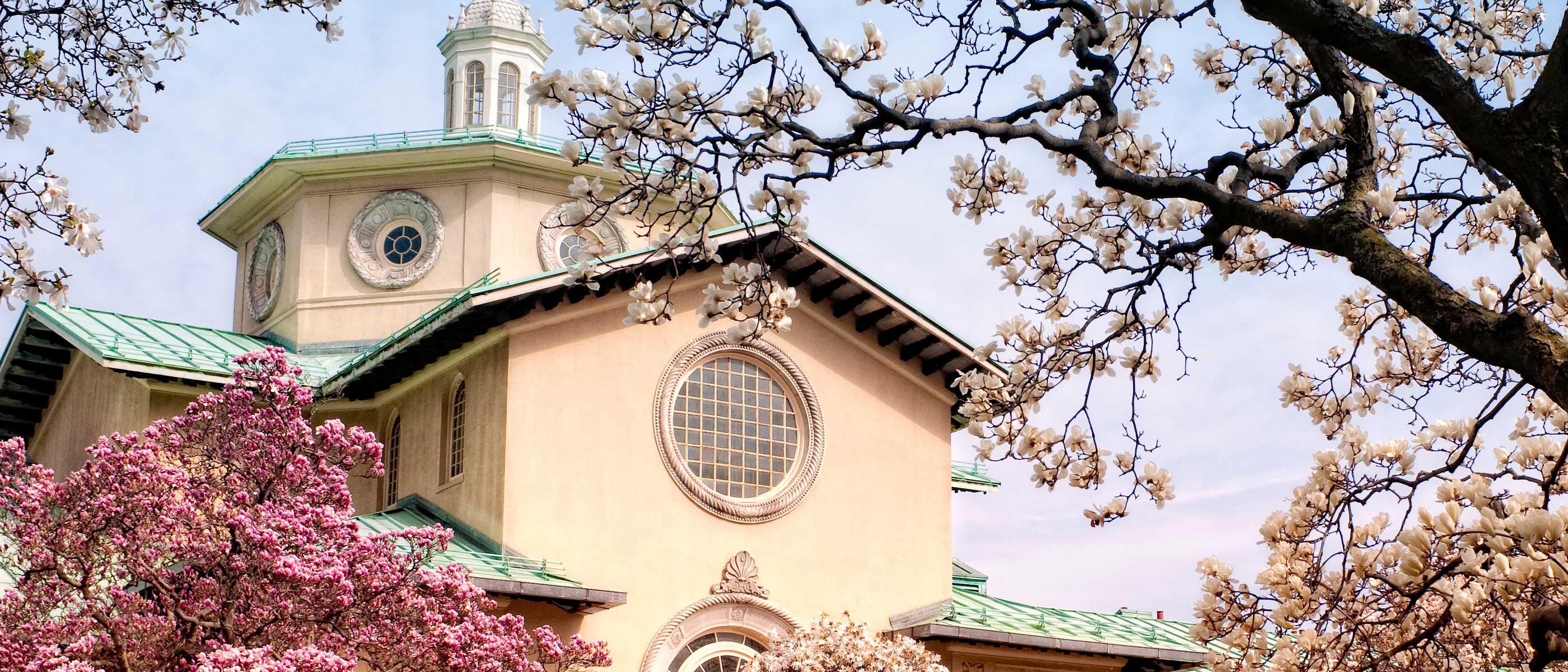Recycled Products—Turning Trash into Garden Tools
Ever hiked the winding, fragrant trails of Mount Rumpke? At 1,045 feet above sea level, Rumpke is the second highest point in the state of Ohio. But its slopes aren't exactly what nature lovers would consider a draw. This "mountain" is no wildflower-strewn geological phenomenon carved by the slow retreat of majestic glaciers. Rumpke is a landfill. And at 234 acres, it's one of the largest in the nation. Every day, garbage trucks dump 4,400 tons of waste on its rolling foothills. If you're planning a trip you'd better hurry, though. Mount Rumpke is expected to peak in another 15 years and then shut down.
Rumpke is only one in a vast range of expiring North American landfills. In fact, two thirds have closed since 1970 and, according to a recent survey by the National Solid Waste Management Association, half of those that remain will reach full capacity within the next ten years. The aging of the nation's landfills is creating enormous demand for the siting of new ones. However, since the early 1980s and the discovery that decomposing organic matter in landfills causes a serious threat to air and water quality, the federal Environmental Protection Agency has been introducing stringent regulations making it very difficult to do just that.
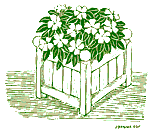
Public disdain for landfills is widespread and threatens to complicate matters even further. As much a symptom of the NIMBY—Not in My Back Yard—syndrome as a reflection of genuine concern for the environment, this disdain doesn't prevent us from generating a staggering 200 million tons of municipal solid waste (MSW) a year—more than double the figure for 30 years ago. And, gardeners should note, according to the Environmental Defense Fund, an environmental advocacy group, at least 10 percent of this MSW is made up of leaves and grass clippings.
Recyc-ology
Our priority in this matter, obviously, is to reduce the overall volume of waste we generate. This may be too tall an order for a society that often seems devoted to consumption for consumption's sake. A more realistic solution to the growing crisis in waste management, as we all know by now, is recycling. Currently, 17 percent of MSW is being recycled in the United States. As I hope this article and garden product guide will demonstrate, the potential is there to recycle so much more.
Avoiding a garbage avalanche on Mount Rumpke is not the only reason to recycle, of course. Recycling prevents global habitat destruction by providing industry with an alternative, ready source of "raw" material. It leads, therefore, to the conservation of energy, the reduction of industrial pollution, and the preservation of species biodiversity.
Recycling is more than a matter of scrubbing out plastic containers, tying old newspapers into perfect little squares, and waltzing them all into appropriately colored recycling bins. If recycling is to succeed, we need to "close the loop," as the jargon goes—not only by buying goods made from or packaged in recyclable materials, but goods made from recycled materials as well. Most of us have held a soda can long enough to read the label describing how 50 percent or more of the aluminum in the container is recycled. Anyone who has purchased recycled stationery—some of it oh-so-chic—has contributed to a reduction in the annual volume of timber harvested in this country. But in the argot of recycled products there's an important distinction to be made between pre-consumer and post-consumer recycled waste.
Pre-consumer or post-industrial waste is the trimming and scrap that is left over on the factory floor after the manufacturing process has been completed. Manufacturers who reuse these scraps rather than dump them are, in some sense of the word, recycling, but they are still working with a virgin material. Post-consumer waste, in contrast, is the stuff that has already passed through our hands: detergent bottles, pizza boxes, eggshells, shredded government documents. Consequently, looking for the highest percentage of post-consumer recycled content in a product helps ensure that the cartons and cans we set out on the curb each week are actually finding their way back to us. It is not always easy to do so since industries are under no obligation to make the distinction for us, and because product labeling is so poorly regulated and widely abused. A little investigative work may be required—a phone call to the manufacturer here, a letter there—but it's always empowering to know exactly what you are buying.
A Gardener's Guide to Recycled Products
Recent consumer surveys by the Pennsylvania Resources Council, a nonprofit citizen action organization, show that, contrary to common fears, recycled products are of equal or better quality than those made with virgin materials. Recycled products for the most part are price competitive, and will become increasingly so as more and more of us seek them out.
Here is a representative sampling of recycled products that are designed for use in the garden and available on the market. The products, which include planter boxes and compost bins made out of recycled plastic milk jugs, garden hoses constructed from old car tires, and birdbaths molded with recycled aluminum, are grouped according to the type of recycled material from which they've been made. It is important to note that many of the companies who manufacture these products are just getting started and don't yet have nationwide distribution. (To obtain these products, you can contact the companies directly.) And don't stop here: Scour your home and garden supply centers and mail-order catalogs (such as Gardener's Supply Company) for other goods with recycled content, and lobby them to carry more of these products to help make all of our gardens greener.
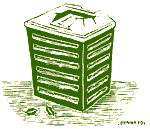
Compost
Composting, as any gardener worth his salt is well aware, is the controlled decomposition of organic matter by microorganisms into a humus-like product. It captures and accelerates nature's own recycling mechanisms. Given that 68 percent of MSW is organic (yard, food, paper, and wood waste), the American Composting Council can't be too wide of the mark with its slogan, "If you are not composting, you're not recycling."
Compost is the ultimate soil conditioner, restoring the soil's natural balance and health. Its porosity and sponge-like structure help aerate soil and retain moisture, while at the same time allowing for good drainage. Application of compost reduces water run-off, and enables plant roots to penetrate deeper and soil to hold onto valuable nutrients. As a mulch, it helps control weeds, prevent soil erosion, and protect plant roots from fluctuations in temperature.
The most efficient way to obtain compost is to do it yourself. Backyard composting saves you money that would otherwise be spent on soil amendments, and also saves on tax dollars that would otherwise be spent on collection and processing by municipal services. You don't need much space, or even a backyard, to compost. There is a composting method out there to suit your needs, and there are compost bins—constructed out of recycled materials—available in all shapes and sizes for recycling your yard waste and food scraps. (For detailed instructions on composting, consult Brooklyn Botanic Garden's handbook, Easy Compost: The Secret to Great Soil and Spectacular Plants.)
If you need more compost than you can make on your own, you can find a wide variety of commercial composts at your local garden center, or get a list of suppliers from your local Cooperative Extension office.
Listed below is a sample source for bulk commercial compost, as well as two companies which manufacture compost bins from recycled plastics:
PRS Materials, Inc.P.O. Box 1409
Collingdale, PA 19023
Phone: (610) 532-3960
Product: Compost
Material: 100% post-consumer biosolids (human sewage) Scepter Corporation
170 Midwest Road
Scarborough, Ontario MIP 3A9
Phone: (416) 751-9445
Product: "Garden Gourmet" composter
Material: 100% post-consumer plastic Smith & Hawken
117 East Strawberry Drive
Mill Valley, CA 94941
Phone: (800) 768-9998
Product: "Biostack" and "Home Composter" compost bins
Material: 60% recycled/30% post-consumer; 100% recycled/60% post-consumer plastic, respectively
Plastic
According to the U.S. Department of Energy's Pittsburgh Energy Technology Center, 30 million tons of plastic are produced in the United States annually—nearly 250 pounds per person. Over 65 percent of this is landfilled. Plastic is made from fossil fuels, and because current fossil-fuel prices have dipped so low, the economic incentive to recycle is minimal. As reported by the Commission for Marketing Recyclable Materials, a government body in King County, WA, only 2 percent of all plastic produced is reused.
Where there's profit margin and environmental entrepreneurship, however, there's a way! One of the most promising recycled plastic products is plastic lumber. In many types of construction work, plastic lumber is a viable, visually appealing, non-toxic alternative to chemically treated wood. Typically made from 100 percent recycled, post-consumer, high-density plastic, this timber substitute is maintenance-free and environmentally friendly. It doesn't rot, crack, splinter, or chip, and is impervious to insects, mold, mildew, and saltwater. Consequently, no staining or sealing is necessary. It never needs paint because colors are molded into the plastic during manufacturing. Fading is kept to a minimum because the colors are UV stabilized. No chemicals are used and no emissions or effluent are created during the grinding, melting, and reforming of the recyclable plastic. Best of all for plant enthusiasts, plastic lumber is used to make such garden amenities as decks, benches, picnic tables, planting boxes, trellises, and raised flower beds. Recycled plastic can also be molded to make compost bins, garden tiles, planters, rakes and pans, and garden hoses.
Recycled plastic can be combined with wood waste to make composite lumber alternatives like "Trex" and "ChoiceDek." Manufacturers claim that these products take paint better and have a more "woodlike" texture than lumber made from plastic alone, but cannot be used for structural support.
To purchase plastic lumber, contact the manufacturers directly. Some products listed below are available from stores such as Walmart and The Home Depot.
The Plastic Lumber Company540 South Main Street
Building # 7
Akron, OH 44311
Phone: (800) 886-8990
Products: Plastic lumber decking, picnic tables
Material: 97% post-consumer recycled plastic Amazing Recycled Products
P.O. Box 312
Denver, CO 80201
www.amazingrecycled.com
Phone: (800) 241-2174
Products: Plastic lumber, flower pots (and plant trolleys from 100% recycled wood pallets)
Material: 100% post-consumer plastic Aeolian Enterprises, Inc.
P.O. Box 888
Latrobe, PA 15650
www.whm248.wix.com
Phone: (724) 539-9460
Products: Plastic lumber, picket fencing, raised-bed kit
Material: 10-100% recycled plastic; 70% post-consumer Government Sales Associates
P.O. Box 1507
Goldenrod, FL 32722
Phone: (407) 679-1759
Products: "Polywood" outdoor furniture
Material: 100% recycled plastic Dayco Swan Products
201 Beal Avenue
Bucyrus, OH 44820
Phone: (419) 562-1011
Product: "Swan" plastic garden hose
Material: 65% pre-consumer recycled plastic Koller-Craft Plastic Products
1400 S. Highway 141
Fenton, MO 63026
Phone: (314) 343-9220
Products: "Tuff-Rake" and "Jumbo Yard Pan" for garden clean-up
Material: 95% post-consumer recycled plastic Trex Company
29 South Cameron Street
Winchester, VA 22601
Phone: (800) BUY-TREX
Product: "Trex" decking lumber
Material: 100% recycled plastic/wood composite Advanced Environmental Recycling Technologies, Inc.
FM 2169 HC10, Box 116
Junction, TX 76949
Phone: (800) 951-5117
Product: "ChoiceDek" decking lumber
Material: 48% recycled plastic, 52% recycled wood
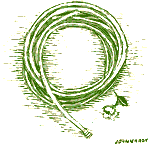
Rubber
In 1993, President Bill Clinton installed a quarter-mile running track around the South Lawn of the White House. But it was no ordinary track: He had it surfaced with 13 tons of material made from recycled scrap tires. Such presidential symbolism is important when you consider that the United States discards over 250 million used tires every year, according to the Scrap Tire Management Council. Only 18 percent of these are currently being recycled—into products such as floor mats and shoe soles.
Scrap tires can be shredded to make crumb rubber, which has many applications in the construction industry. Crumb rubber also makes a very effective mulch for perennials, retaining moisture and suppressing weed growth, thus reducing the amount of pesticide, fertilizer, and irrigation needed to sustain plants. It looks like a rich, dark soil but, unlike organic mulches, doesn't decompose or attract pests.
A number of other garden products made with recycled rubber are also available, including garden hoses, tiles, and edging. These products contain varying percentages of post-consumer waste, and share many of the same beneficial qualities as the crumb rubber listed above.
Aquapore Moisture Systems, Inc.610 South 80th Avenue
Phoenix, Arizona 85043
Phone: (800) 635-8379
Products: "Moisture Master" drip watering systems, soaker and sprinkler hoses; "Permascape" landscape edging and border, decorative planter mulch, protective tree rings, stepping stones
Material: 50-80% recycled tire rubber Environmental Rubber Recycling, Inc.
1621 Terminal Drive
Saginaw, MI 48601
Phone: (517) 752-8182
Product: Crumb rubber mulch Carlisle Tire & Wheel
621 N. College Street
Carlisle, PA 17013-0099
www.carlisletire.com
Phone: (800) 851-4746
Product: outdoor tile
Material: 85% recycled, 65% post-consumer tire rubber
Wood and Paper
The construction industry has largely ignored the potential for reuse of wood waste, mainly because of the difficulties involved in removing contaminants such as lead-based paints and preservative treatments from wood scrap, and in securing a constant supply due to the seasonal nature of the industry itself. This is beginning to change as new technologies are developed and old habits are overcome.
Meanwhile, wood waste is being used to create a variety of garden furnishings and products, including mulch and picket fencing. And recycled paper is also finding its way into the garden in the form of mulch and molded flower pots, as well as compost.
Henry Molded Products, Inc.71 North 16th Street
Lebanon, PA 17042
Phone: (717) 273-3714
Products: Nursery and greenhouse containers, "Laree" floral containers
Material: 100% post-consumer paper Penn Turf Products
149 W. Fairmont Avenue
State College, PA 16801
Phone: (814) 234-2348
Product: "Penn Mulch," pelletized, for new turf establishment
Material: 95% recycled newspaper, 85% post-consumer Robert Winzinger, Inc.
1704 Marne Highway
Hainesport, NJ 08036
Phone: (609) 267-8600
Product: Mulch
Material: 100% tree stumps and yard waste
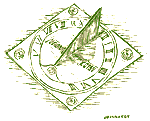
Miscellaneous Products
Companies are discovering applications around the garden for all sorts of recycled materials, for instance, aluminum birdbaths, and organic planting-medium made from old wool.
Whitehall Products, Ltd.8786 Water Street
Montague, MI 49437
www.whitehallproducts.com
Phone: (800) 728-2164
Products: Sundial, birdbath, birdfeeder, hoseholder, weathervane
Material: 100% recycled aluminum
For More Information
- The Consumer's Handbook for Reducing Solid Waste (1992) is a free publication from the EPA that offers 12 ways to cut down on crud. Be sure to include the publication number EPA 530K96003 with your order. Write U.S. EPA, National Center for Environmental Publications and Information, P.O.Box 42419, Cincinnati, OH 45242, or call (800) 490-9198.
- The Guide to Buying Recycled Products for Consumers and Small Business (1998) is a wonderful resource that lists hundreds of products made from recycled materials, shows their post-consumer and total recycled content, and tells you where to buy them. It's available for $6 postpaid from Pennsylvania Resources Council, 3606 Providence Rd., Newtown Square, PA 19073. Or you can call (610) 353-1555 or browse the publication on the web: www.prc.org/guide/index.htm.
- The Gardener's Supply Company's free catalog features many products made with recycled content, some available nowhere else. For information, write Gardener's Supply, 128 Intervale Rd., Burlington, VT 05401, or call (800)863-1700. Or browse the company's web site: www.gardeners.com.


